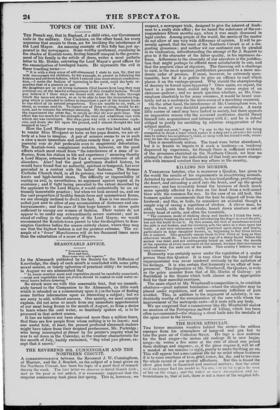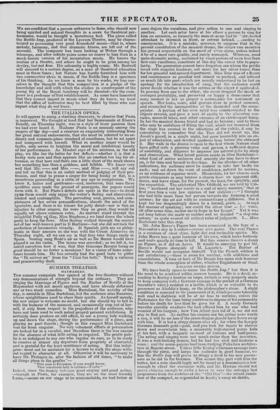THE HOUSE MUSICIAN.
THE house musician wanders behind the scenes—he seldom emerges from his atmosphere of lamp-oil and gas but to take the pure air of Catherine Street. He tags a new cadence for the first singer—he makes old endings fit to new begin- nings—he writes a fire scene at the rate of about one pound three shillings and sixpence, or, if the piece require it, will let off a musket at ten minutes to eight, purely to make the thing go on. This will appear but a mechanical life for an artist whose business it is to raise emotions of love, grief, terror, &c. &C. and to traverse the whole round of our mental affections. But this is found the eftest plan both in theatrical and musical matters ; that the artist shall no longer find his model in Nil: ure, ;)!It in tire copies he sees 01 her on the stage; and the eifect 0 sacii a-at:stations and re- translations is, that at last, there is not a trace of the original left. We are confident that a person unknown to fame, who should now bring spirited and natural thoughts in a score for theatrical per- formance, would be thought a monstrous fool. The piece called the Bottle-Imp, produced at the Lyceum Theatre, may be charac- terized as possessing very good household music—that is, where melody, harmony, and true dramatic fitness, are left out of the account. The composer has been looking at Weber through a telescope, and after infinite pains come no nearer to him than in a mock-heroic version of his incantation music. He knows the routine of a theatre, and where he ought to be grim among his devilry, but not how. His solemnity is highly comic. Mr. Rodwell will succeed to a certain degree, as a man of theatrical education must in these times ; but Nature has hardly furnished him with two consecutive ideas in music, if the Bottle-Imp is a specimen of his thinking. As we know a man by his works, We hug our- selves in the thought that this composition is a pledge of the knowledge and skill with which the studies in counterpoint of the young fry at the Royal Academy will be directed—for the com- poser is a professor of that establishment. As some have lamented that they cannot impart in music what they do know, we trust that the office of instructor may be best filled by those who can impart what they do not know.



















 Previous page
Previous page